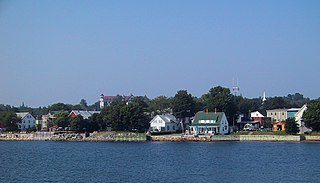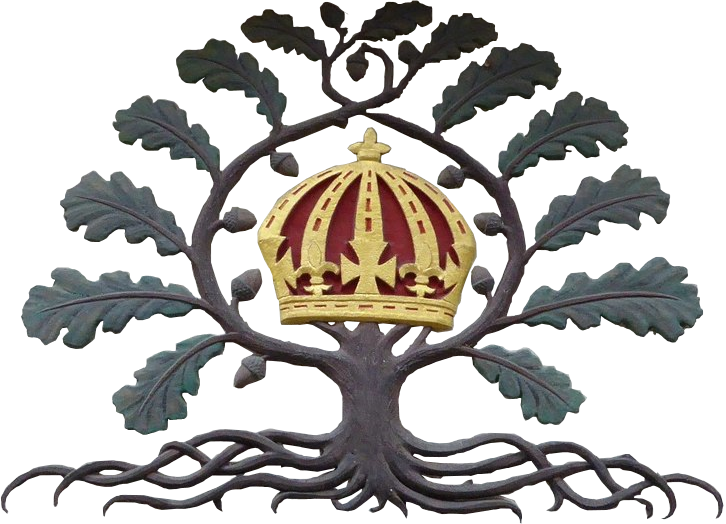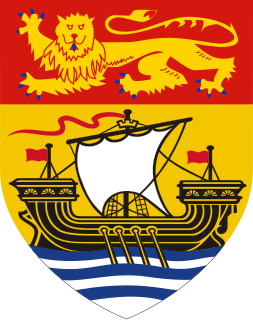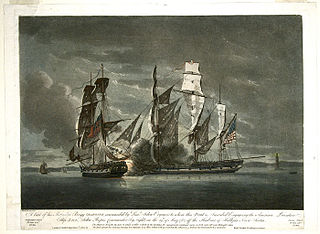
Saint John is a seaport city of the Atlantic Ocean located on the Bay of Fundy in the province of New Brunswick, Canada. Saint John is the oldest incorporated city in Canada, established by royal charter on May 18, 1785, during the reign of King George III. The port is Canada's third largest port by tonnage with a cargo base that includes dry and liquid bulk, break bulk, containers, and cruise. Historically New Brunswick's largest city, in 2016 the city fell to second place, with a population of 67,575 over an area of 315.82 km2 (121.94 sq mi). Greater Saint John covers a land area of 3,362.95 km2 (1,298.44 sq mi) across the Caledonia Highlands, with a growing population of 126,202.

Sampson Salter Blowers was a noted North American lawyer, Loyalist and jurist from Nova Scotia who, along with Chief Justice Thomas Andrew Lumisden Strange, waged "judicial war" in his efforts to free Black Nova Scotian slaves from their owners, leading to the decline of slavery in Nova Scotia.

United Empire Loyalists is an honorific which was first given by the 1st Lord Dorchester, the Governor of Quebec, and Governor-General of the Canadas, to American Loyalists who resettled in British North America during or after the American Revolution. At the time, the 'Demonym Canadian' or Canadien was used to refer to the indigenous First Nations groups and the French settlers inhabiting the Province of Quebec.

Woodstock is a town in Carleton County, New Brunswick, Canada on the Saint John River, 103 km upriver from Fredericton at the mouth of the Meduxnekeag River. It is near the Canada–United States border and Houlton, Maine and the intersection of Interstate 95 and the Trans-Canada Highway making it a transportation hub. It is also a service centre for the potato industry and for more than 26,000 people in the nearby communities of Hartland, Florenceville-Bristol, Centreville, Bath, Meductic, and Canterbury for shopping, employment and entertainment.

Saint Andrews is a town in Charlotte County, New Brunswick, Canada. It is sometimes referred to in tourism marketing by its unofficial nickname "St. Andrews By-the-Sea". It is also known as "Qonasqamkuk" by the Peskotomuhkati (Passamaquoddy) Nation.

Loyalists were American colonists who stayed loyal to the British Crown during the American Revolutionary War, often called Tories, Royalists, or King's Men at the time. They were opposed by the "Patriots", who supported the revolution, and called them "persons inimical to the liberties of America". Prominent Loyalists repeatedly assured the British government that many thousands of them would spring to arms and fight for the crown. The British government acted in expectation of that, especially in the southern campaigns in 1780–81. In practice, the number of Loyalists in military service was far lower than expected since Britain could not effectively protect them except in those areas where Britain had military control. The British were often suspicious of them, not knowing whom they could fully trust in such a conflicted situation; they were often looked down upon. Patriots watched suspected Loyalists very closely and would not tolerate any organized Loyalist opposition. Many outspoken or militarily active Loyalists were forced to flee, especially to their stronghold of New York City. William Franklin, the royal governor of New Jersey and son of Patriot leader Benjamin Franklin, became the leader of the Loyalists after his release from a Patriot prison in 1778. He worked to build Loyalist military units to fight in the war, but the number of volunteers was much fewer than London expected.

A Black Loyalist was a person of African descent who sided with the Loyalists during the American Revolutionary War. In particular, the term refers to men who escaped the enslavement of Patriot masters and served on the Loyalist side because of the Crown's promises of freedom.

Eric Lawrence Teed, was a Canadian lawyer, author, history, civil rights advocate and politician.

St. Martins is a village on the Bay of Fundy in Saint John County, New Brunswick, Canada. The village had a population of 276 as of the 2016 census.
The Pioneer and Historical Society of Muskingum County, also known as the Zanesville Historical Society, is an organization located in Zanesville, Ohio, in the United States, with the mission of preserving the history of the Zanesville and Muskingum County region of Ohio. It is a non-profit entity which operates several important historic sites in and around the Zanesville, Ohio, area, including the Dr. Increase Mathews House, built in 1805 by a founder of the town; and the Stone Academy, erected in 1809 as a possible state capitol, which was also a meeting place for abolitionist societies, and once the home of writer Elizabeth Robins, who wrote about it. The Pioneer and Historical Society of Muskingum County received a Preservation Merit Award from the Ohio Historic Preservation Office Award in 1993 for its work restoring and preserving the Stone Academy.

The Old Burying Ground is a historic cemetery in Halifax, Nova Scotia, Canada. It is located at the intersection of Barrington Street and Spring Garden Road in Downtown Halifax.

New Brunswick, is one of the three Maritime provinces in Canada, and the only officially bilingual province (English-French) in the country. The history of New Brunswick can be viewed according to four periods: pre-European contact, French colonization, British colonization and finally, New Brunswick since Confederation.
The history of the area comprising the U.S. state of Maine spans thousands of years, measured from the earliest human settlement, or less than two hundred, measured from the advent of U.S. statehood in 1820. The present article will concentrate on the period of European contact and after.

David Russell Jack was a Canadian author, editor, publisher, and politician.

Loyalist House is a museum and National Historic Site located in uptown Saint John, New Brunswick. It was the home of the prosperous Merritt family, who occupied from its completion in 1817 until 1958. It was taken over by the New Brunswick Historical Society in 1961. Its current address is 120 Union Street.

New Ireland was a Crown colony of the United Kingdom established in modern-day Maine after British forces captured the area during the American Revolution and again during the War of 1812. The colony lasted four years during the Revolution, and eight months during the War of 1812. At the end of each war the United Kingdom ceded the land back to the United States under the Treaty of Paris and Treaty of Ghent, respectively.
Benjamin Milliken was an American Loyalist, major landowner, mill and ship owner in Maine in the Province of Massachusetts Bay, British North America. He was the founder of Ellsworth, Maine in 1763, laid out and received the land grant for the Township of Bridgton, Maine in 1765 and was one of the first settlers in Bocabec and St. Andrew's, New Brunswick in 1784.
Abijah Willard was a soldier during the French and Indian War who wrote a journal during the Expulsion of the Acadians. During King George's War, he fought in the Siege of Louisbourg (1745). During the French and Indian War, he fought in the Battle of Fort Beauséjour.
The St. Augustine Historical Society (SAHS) is a membership organization committed to the preservation and interpretation of historically significant structures, artifacts, and documentary materials related to St. Augustine, Florida. Formally organized on New Years Day 1883, SAHS is the oldest continuously operating museum and historical society in Florida. In 1899, the society purchased the Vedder Museum on Bay Street where it exhibited historical and scientific curiosities until losing its holdings in the Saint Augustine Fire of 1914. In 1920, SAHS successfully lobbied for federal restoration of Fort Matanzas, and in 1965, it played a significant role in the restoration of numerous historic sites in preparation for the St. Augustine quadricentennial.

Nova Scotia was heavily involved in the American Revolution. The American Revolution (1776–1783) had a significant impact on shaping Nova Scotia. At the beginning, there was ambivalence in Nova Scotia, "the 14th American Colony" as some called it, over whether the colony should join the Americans in the war against Britain. Largely as a result of American Privateer attacks on Nova Scotia villages, as the war continued, the population of Nova Scotia solidified their support for the British. Nova Scotians were also influenced to remain loyal to Britain by the presence of British military units, judicial prosecution by the Nova Scotia Governors and the efforts of Reverend Henry Alline.














